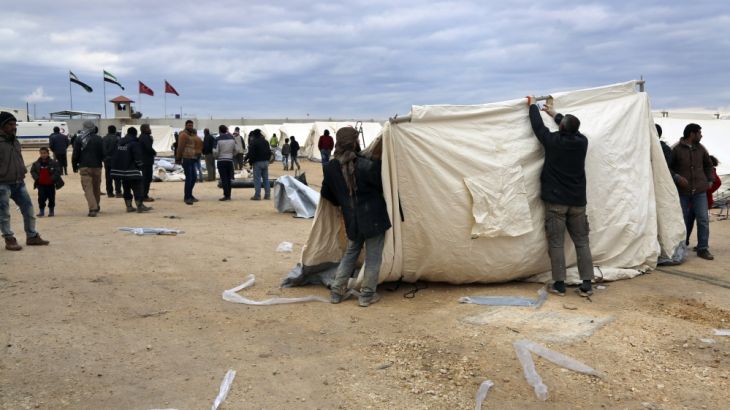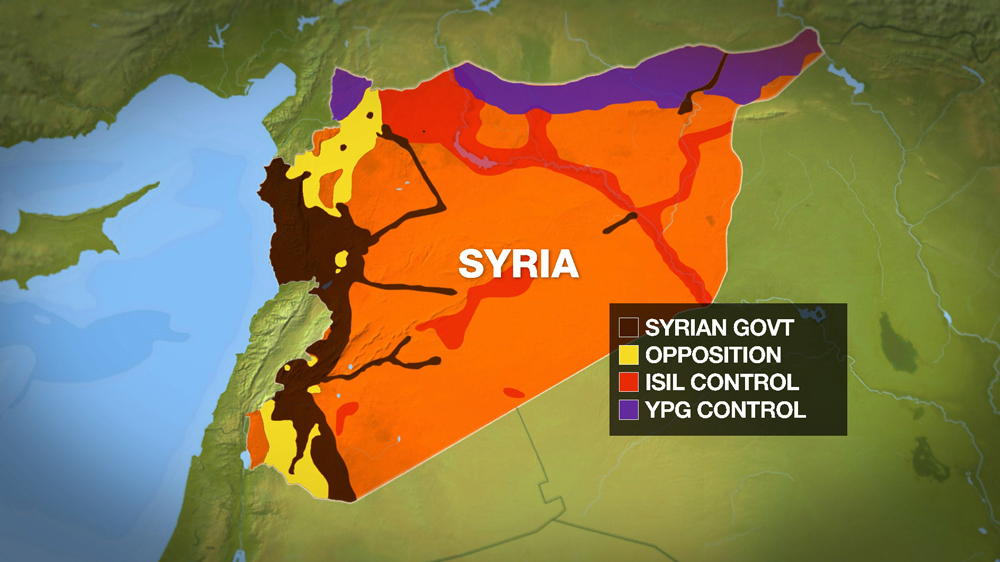Turkey and Germany agree on plan to ease refugee crisis
Steps unveiled during Merkel’s visit include push to halt assault on Syrian city of Aleppo and curb “illegal migration”.

Turkey and Germany have agreed on a set of measures to deal with the Syrian refugee crisis, including a joint diplomatic initiative aiming to halt attacks against Aleppo, Syria’s largest city.
Officials from the two countries announced on Monday in Ankara that they would also push to curb what they called illegal migration.
German Chancellor Angela Merkel, who was in the Turkish capital for talks on how to reduce the influx of refugees into Europe, said after discussions with Ahmet Davutoglu, Turkey’s prime minister, that she was “not just appalled but horrified” by the suffering caused by Russian bombing in Syria.
Merkel said Turkey and Germany will push at the United Nations for everyone to keep to a UN resolution passed in December that calls on all sides to halt without delay attacks on the civilian population.
READ MORE: UN probe finds “extermination” of detainees in Syria
“We have been, in the past few days, not just appalled but horrified by what has been caused in the way of human suffering for tens of thousands of people by bombing – primarily from the Russian side,” she said.
“Under such circumstances, it’s hard for peace talks to take place, and so this situation must be brought to an end quickly.”
Davutoglu, for his part, said the city of Aleppo was “de facto under siege. We are on the verge of a new human tragedy.”
“Russians are carpet-bombing – they want to clean the entire region so as to make sure the Damascus [Syrian] army will take over and push on to the Turkish border,” Cengiz Aktar, a political scientist with the Istanbul Policy Centre, told Al Jazeera.
“This will make the lives of refugees more difficult.”
Thousands stranded
The Germany-Turkey talks come as tens of thousands of Syrians remain stranded at the border with Turkey after fleeing a Russia-backed government offensive in Aleppo.
Turkey is facing pressure from the European Union to open its border to up to 35,000 Syrians who have massed along the frontier in the past few days, fleeing an onslaught by government forces.
The discussions also came as reports emerged that at least 33 people died off Turkey’s coast as they tried to reach Greece.
|
|
The coastguard has launched a search-and-rescue mission, including helicopters, to try to find 14 migrants who are reported to be missing.
The International Organization for Migration says that 374 refugees and other migrants have died so far this year while trying to reach Greece.
Turkey, a key country on their route to Europe, is central to Merkel’s diplomatic efforts to reduce the flow.
Germany saw an unprecedented 1.1 million asylum seekers arrive last year, many of them fleeing the conflicts in Syria, Iraq and Afghanistan.
Davutoglu said that the two countries’ security forces would increase efforts to thwart illegal migration and combat smuggling groups.
The two leaders would also be trying to get NATO’s involvement in the refugee issue, Davutoglu said.
He said they would seek the use of NATO’s observation capabilities at the border with Syria and in the Aegean Sea.
He said the two countries’ aid organisations would cooperate in providing aid to Syrians at the border.
Turkey’s contention
Turkey, already home to 2.5 million Syrian refugees, says it has reached its capacity to absorb refugees but has indicated that it will continue to provide refuge.
It agreed in November to fight smuggling networks and help to curb irregular migration.
In return, the EU has pledged €3bn ($3.3bn) to help to improve the condition of refugees, and to grant political concessions to Turkey, including an easing of visa restrictions and the fast-tracking of its EU membership process.
Turkey has since started to require Syrians arriving from developing countries to apply for visas, in an effort to exclude those who aim to continue on to Greece.

Turkey has also agreed to grant work permits to Syrians as an incentive for them to stay in Turkey, and has announced plans to increase coastguards’ capabilities and designate human smuggling as a form of organised crime – which would bring stiffer punishments.
Al Jazeera’s Stefanie Dekker, reporting from Turkey’s Kilis province near the Syria border, said trucks carrying scaffolding were seen passing through the border on Sunday.
“We know they are building tents and facilities for the thousands of people camped on the other side of the border,” she said.
“But there is no movement on this side. It’s very quiet and the border is still closed.”
Governor’s account
Suleyman Tapsiz, governor of Kilis, said Turkey was taking care of the tens of thousands of refugees who had gathered around the nearby Syrian city of Azaz over the space of 48 hours.
Another 70,000 refugees may head for the frontier if Russian air strikes and Syrian regime military advances continue in Aleppo, Tapsiz said.
Carrying their few belongings, Syrians queued in the cold and rain in squalid camps waiting for tents that are being distributed by aid agencies, AFP news agency reported.
ANALYSIS: How Russia keeps piling pressure on Turkey
Others are reportedly sleeping in fields and on roads, it said.
Speaking to Al Jazeera from Gaziantep in Turkey, Fadi Hajjar, a Syrian activist belonging to the Aleppo Media Centre, said there were between 30,000 and 50,000 people waiting at the border.
“This number is likely to increase in the coming days,” he said on Sunday.
“Some villages in Aleppo have been completely emptied of people.”
